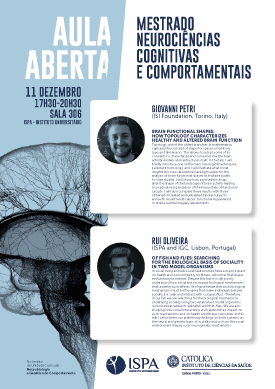No âmbito da Unidade Curricular Neurobiologia e Genética do Comportamento do Mestrado em Neurociências Cognitivas e Comportamentais, irá realizar-se uma Aula Aberta que contará com as talks de Giovanni Petri (ISI Foundation, Torino, Italy) e de Rui Oliveira (ISPA and IGC, Lisbon, Portugal).
17H30h – Giovanni Petri (ISI Foundation, Torino, Italy)
Brain functional shapes: how topology characterizes healthy and altered brain function
Topology, one of the oldest branches of mathematics, captures the concept of shape for spaces of arbitrary type and dimension. This allows to adopt some of its concepts to characterize and compare how the brain activity evolves and restructures itself. In the talk, I will briefly introduce one of the main topological techniques, persistent homology, and I will illustrate what novel insights this new descriptive paradigm yields for the analysis of brain functionial spaces at multiple scales. As case studies, I will show how psychedelic drugs alter the shape of the landscape of brain activity leading to a radical reorganization of the hierarchies of functional circuits. I will also compare these results with those obtained in treated and untreated bipolar subjects, and with recent results about functional equivalence in simple mental imagery experiments.
19H00h – Rui Oliveira (ISPA and IGC, Lisbon, Portugal)
Of Fish and Flies: searching for the biological basis of sociality in two model organisms
In social living animals social relationships have a major impact on health and concomitantly on fitness outcomes that shape evolutionary processes. Despite this fact it is still poorly understood how social factors impact biological mechanisms that underlie such effects. We hypothesize that such biological mechanisms must be the same that make individuals behave socially (i.e. seek and interact with conspecifics). Therefore, in our lab we are searching for the biological mechanisms underlying sociality using two established model organisms in biomedical research: zebrafish and fruit-flies. We are also studying how social interactions and relationships impact on such mechanisms and on health and fitness outcomes. In this talk I will present our preliminary findings on both systems on the neural and genetic basis of sociality and on how the social environment shapes such neurogenetic mechanisms.


